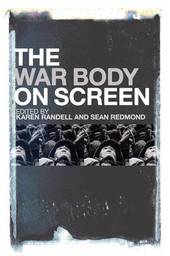
|
The War Body on Screen
Paperback / softback
Main Details
| Title |
The War Body on Screen
|
| Authors and Contributors |
Edited by PhD Karen Randell
|
|
Edited by Sean Redmond
|
| Physical Properties |
| Format:Paperback / softback | | Pages:288 |
|
| Category/Genre | Film theory and criticism |
|---|
| ISBN/Barcode |
9781441161857
|
| Classifications | Dewey:791.43658 |
|---|
| Audience | | Tertiary Education (US: College) | |
|---|
| Illustrations |
10
|
|
Publishing Details |
| Publisher |
Continuum Publishing Corporation
|
| Imprint |
Continuum Publishing Corporation
|
| Publication Date |
22 March 2012 |
| Publication Country |
United States
|
Description
The discussion of the war body on screen is best served by drawing upon multiple and diverging view points, differing academic backgrounds and methodological approaches. A multi-disciplinary approach is essential in order to capture and interpret the complexity of the war body on screen and its many manifestations.In this collection, contributors utilize textual analysis, psychoanalysis, post-colonialism, comparative analysis, narrative theory, discourse analysis, representation and identity as their theoretical footprints. Analysis of the impact of new media and information technologies on the construction and transmission of war bodies is also been addressed. The War Body on Screen has a highly original structure, with themed sections organized around 'the body of the soldier'; 'the body of the terrorist'; and 'the body of the hostage'.
Author Biography
Karen Randell is Deputy Dean of Arts and Humanities and Associate Professor of Film and Culture at Nottingham Trent University, UK. She is published on trauma in film in Art in the Age of Terrorism (2005) and in SCREEN. She is co-editor of Screen Methods: Comparative Readings in Film Studies (2005) with Jacqueline Furby. Sean Redmond is Associate Professor at Deakin University in Melbourne, Australia. He is the author of The Culture of Blood, and editor of Liquid Metal: The Science Fiction Film Reader.
ReviewsThe War Body on Screen is a breathtaking exploration of terror and pain in the modern world. Its passionate engagement with the big issues of our time and its intellectual rigour make it indispensable reading. - Joanna Bourke, Professor of History, Birkbeck College
|